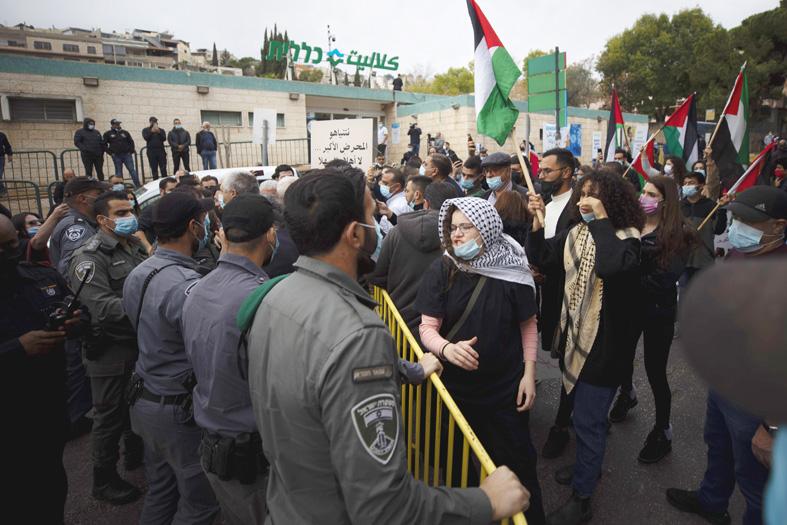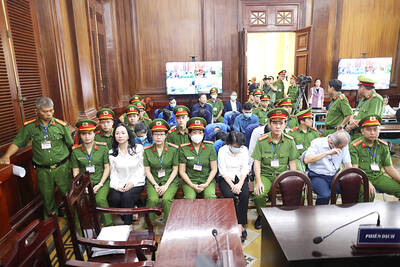Israeli Prime Minister Benjamin Netanyahu, who is facing his fourth re-election battle in two years, is courting Arab Israelis.
“A new era begins today,” Netanyahu said during a visit this month to Nazareth, Israel’s largest Arab city.
Netanyahu, threatened by a damaging split in his Likud party, has made several stops in a game-changing charm offensive toward Arab voters.

Photo: AP
At a vaccination center in Umm al-Fahm on Jan. 1, he highlighted Israel’s rapid inoculation program amid the COVID-19 pandemic, while in Nazareth he promised investment and anti-crime initiatives, and apologized for potentially offensive past remarks.
Arab Israelis — usually Palestinians who stayed on their land following the Jewish state’s creation in 1948, and their descendants — make up about 20 percent of the country’s roughly 9 million people.
The community’s growing political importance was evident in the last vote, in March last year, when the mainly Arab Joint List alliance won an unprecedented 15 seats in the 120-member Knesset, forming a key part of the anti-Netanyahu bloc.
Netanyahu has on several occasions in the past few years called some Arab Israelis and their political leaders terrorism supporters and enemies of the state.
Experts described his new pitch to Arabs as a nuanced political maneuver aimed at boosting his own support, while also sowing enough political chaos to discourage some Arabs from voting, thereby trimming the influence of his Arab rivals.
Netanyahu is seeking to “win Arab votes, but especially wants to weaken the Joint List,” Tel Aviv University political science professor Jamal Amal told reporters.
Among Netanyahu’s record of anti-Arab rhetoric, a statement from Israel’s 2015 election stands out.
In a polling-day bid to energize supporters, he warned that Arab Israelis were voting “in droves” and suggested that left-wing groups had bussed Arab citizens to polling stations.
Then-US president Barack Obama accused Netanyahu of portraying Arab Israelis as “an invading force.”
Arabs have long complained of discrimination by Israeli police and say that their plight has worsened since Netanyahu returned to power in 2009.
The Israeli Nation-State law passed in 2018, which declared Israel as the “national home of the Jewish people,” was widely perceived as legally downgrading Arabs as lesser citizens.
Despite that record, Netanyahu has often argued that his governments have invested heavily in minority communities and “done more for Arabs than any other government.”
While some protesters in Nazareth attempted to shout Netanyahu down, he secured an endorsement from the city’s mayor, Ali Salam.
Netanyahu, known as the great survivor of Israeli politics, faces the daunting challenge of securing a 61-seat Knesset majority in Israel’s March 23 election.
Multiple recent polls suggest that Likud defector Gideon Saar, who has formed his own New Hope party, could peel a substantial number of seats away from Netanyahu.
Saar has categorically ruled out joining a Netanyahu-led government.
The pledge, if true, could deliver a hammer blow to the prime minister, who failed to secure a majority in three elections since April 2019 when Likud was united behind him.

Republican US lawmakers on Friday criticized US President Joe Biden’s administration after sanctioned Chinese telecoms equipment giant Huawei unveiled a laptop this week powered by an Intel artificial intelligence (AI) chip. The US placed Huawei on a trade restriction list in 2019 for contravening Iran sanctions, part of a broader effort to hobble Beijing’s technological advances. Placement on the list means the company’s suppliers have to seek a special, difficult-to-obtain license before shipping to it. One such license, issued by then-US president Donald Trump’s administration, has allowed Intel to ship central processors to Huawei for use in laptops since 2020. China hardliners

A top Vietnamese property tycoon was on Thursday sentenced to death in one of the biggest corruption cases in history, with an estimated US$27 billion in damages. A panel of three hand-picked jurors and two judges rejected all defense arguments by Truong My Lan, chair of major developer Van Thinh Phat, who was found guilty of swindling cash from Saigon Commercial Bank (SCB) over a decade. “The defendant’s actions ... eroded people’s trust in the leadership of the [Communist] Party and state,” read the verdict at the trial in Ho Chi Minh City. After the five-week trial, 85 others were also sentenced on

Conjoined twins Lori and George Schappell, who pursued separate careers, interests and relationships during lives that defied medical expectations, died this month in Pennsylvania, funeral home officials said. They were 62. The twins, listed by Guinness World Records as the oldest living conjoined twins, died on April 7 at the Hospital of the University of Pennsylvania, obituaries posted by Leibensperger Funeral Homes of Hamburg said. The cause of death was not detailed. “When we were born, the doctors didn’t think we’d make 30, but we proved them wrong,” Lori said in an interview when they turned 50, the Philadelphia Inquirer reported. The

RAMPAGE: A Palestinian man was left dead after dozens of Israeli settlers searching for a missing 14-year-old boy stormed a village in the Israeli-occupied West Bank US President Joe Biden on Friday said he expected Iran to attack Israel “sooner, rather than later” and warned Tehran not to proceed. Asked by reporters about his message to Iran, Biden simply said: “Don’t,” underscoring Washington’s commitment to defend Israel. “We are devoted to the defense of Israel. We will support Israel. We will help defend Israel and Iran will not succeed,” he said. Biden said he would not divulge secure information, but said his expectation was that an attack could come “sooner, rather than later.” Israel braced on Friday for an attack by Iran or its proxies as warnings grew of